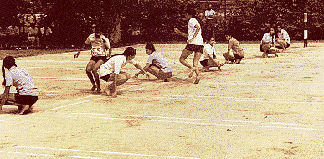| Games of Ancient India | |
| Asol Aap | |
| Boat Race | |
| Dhopkhel | |
| Gella-Chutt | |
| Hiyang Tannaba | |
| Inbuan | |
| Insuknawr | |
| Kabaddi | |
| Kang Shanaba | |
| Kho Kho | |
| Khong Kangjei | |
| Kirip | |
| Lamjei | |
| Mallakhamb | |
| Mizo Inchai | |
| Mukna | |
| Nagaland & Arunachal Games | |
| Sagol Kangjei | |
| Yubee-Lakpee Archery | |
| Kho-Kho
Like all Indian games, it is simple, inexpensive and enjoyable. It does, however, demand physical fitness, strength, speed and stamina, and a certain amount of ability. Dodging, feinting and bursts of controlled speed make this game quite thrilling. To catch by pursuit - to chase, rather than just run - is the capstone of Kho-Kho.The game develops qualities such as obedience, discipline, sportsmanship, and loyalty between team members. The rules of the game were framed in the beginning of the 20th century. At Gymkhana Poona, a Committee was formed in 1914, to frame its rules. The first ever rules on Kho-Kho were published from Gymkhana Baroda, in 1924. In 1959-60, the first national Kho-Kho championship was organised in Vijayawada (Andhra Pradesh). The Government has initiated the following awards for the game: Arjuna Award, Eklavya Award for men, Rani Laxmi Bai award for women, Veer Abhimanyu award for boys under 18, and Janaki award for girls under 16. How the game is played Each team consists of twelve players, but only nine players take the field for a contest. A match consists of two innings. An innings consists of chasing and running turns of 7 minutes each. Eight members of the chasing team sit in their eight squares on the central lane, alternately facing the opposite direction, while the ninth member is an active chaser, and stands at either of the posts, ready to begin the pursuit. Members of the chasing team have to put their opponent out, touching them with their palms, but without committing a foul. All the action in Kho-Kho is provided by the defenders, who try to play out the 7 minutes time, and the chasers who try to dismiss them. A defender can be dismissed in three ways: 1) if he is touched by an active chaser with his palm without committing a foul, 2) if he goes out of the limits on his own, 3) if he enters the limit late. Defenders enter the limit, in batches of three. After the third and last defender of batch is out, the next batch must enter the limits, before a 'kho' is given by the successful active chaser. Defenders have full freedom of movement on both sides of the central lane, but the active chaser cannot change the direction to which he is committed. He cannot cross the central lane. An active chaser can change position with a seated chaser, by touching him from behind by palm, and uttering the word 'kho' loudly, and simultaneously, chase or attack is build up through a series of 'khos' as the chase continues with a relay of chasers. At the end of the innings there is an interval of 5 minutes and an interval of 2 minutes, in between the turns. Each side alternates between chasing and defence. Kho-Kho can be played by men, women, and children of all ages. The game requires a very small piece of evenly surfaced ground, rectangular in shape, and 27m by 15m. The only equipment required are the two poles. The game lasts no more than 37 minutes. Domestic seasons and tournaments The following championships are organised for this game: National Championships, Junior National, Sub Junior National Championship, School Championship, Mini School Championship, Primary Mini School Championship, National Women Championship, All India Inter University Championship and Federation Cup Organisations involved with the sport in India The primary sports body for this game is called the Kho-Kho Federation of India (K.K.F.I.). It has its branches in all the states and it has been conducting Mini, Junior and Open National Championships for both sexes, in many parts of India. Key Players A number of players have bagged the Arjuna Award. Some of these players are: Shri Shekhar Dharwadkar, Shri Shrirang Inamdar, Usha Nagarkar, Nilima Sarolkar, Achala Devare. |
 Kho-Kho
ranks as one of the most popular traditional sports in India. The origin
of Kho-Kho is difficult to trace, but many historians believe, that it
is a modified form of 'Run Chase', which in its simplest form involves
chasing and touching a person. With its origins in Maharashtra, Kho-Kho
in ancient times, was played on 'raths' or chariots, and was known as
Rathera.
Kho-Kho
ranks as one of the most popular traditional sports in India. The origin
of Kho-Kho is difficult to trace, but many historians believe, that it
is a modified form of 'Run Chase', which in its simplest form involves
chasing and touching a person. With its origins in Maharashtra, Kho-Kho
in ancient times, was played on 'raths' or chariots, and was known as
Rathera.